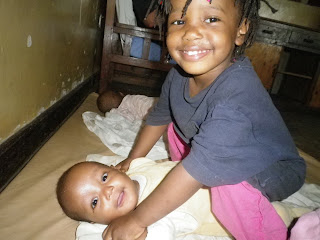 |
| Loveness cuddling Gracie |
While many of us might instinctively applaud the idea of putting children back into families rather than institutionalized care, there are some serious problems with using this model in Sub-Saharan Africa. In almost all cases, extended families that are able and willing to care for orphaned children do so from day one. The fact that children have ended up in an orphanage indicates that this is not an option for their families. As we discuss on our meet the kids page, placing a child in an orphanage is never an easy decision for surviving family members, nor is it undertaken lightly - however, it is often the better choice for their long term well-being. I think we can all agree that if there were safe, stable, and financially secure foster or adoptive homes for all of the children, there would be no issue. The fact is that too many families in East Africa are simply unable to open their homes to another child. Shunting children into families that are unable to care for them adequately unfortunately does nothing but encourage resentment and neglect.
 At Nkoaranga, before the formation of The Foundation For Tomorrow, which helps us place the children in high quality boarding schools when they age out of the orphanage, children used to be returned to their extended families at the age of five, or shuffled into orphanages for older children. Mama Pendo, who has run the orphanage for twenty two years, told us that she could no longer do that after spending years following up on the kids and finding far too many unhealthy, neglected, and sometimes abused. Families that are able to care for the children are always encouraged to bring them home - but forcing children onto families that are unable or unwilling to care for them is deeply unsafe and unfair for all involved.
At Nkoaranga, before the formation of The Foundation For Tomorrow, which helps us place the children in high quality boarding schools when they age out of the orphanage, children used to be returned to their extended families at the age of five, or shuffled into orphanages for older children. Mama Pendo, who has run the orphanage for twenty two years, told us that she could no longer do that after spending years following up on the kids and finding far too many unhealthy, neglected, and sometimes abused. Families that are able to care for the children are always encouraged to bring them home - but forcing children onto families that are unable or unwilling to care for them is deeply unsafe and unfair for all involved.Many of the Rwandan children interviewed expressed deep trepidation over the impending move. Not only are they uncertain of the reception they will receive, but they are deeply troubled at the idea of being separated from their effective brothers and sisters, the orphanage "families" that have been their support system for so many years. At the Noel Nyundo Orphanage, Rwanda's oldest and largest facility, "A boy stood and suggested they remain at the center until they finish school, and his fellow orphans laughed and applauded. Another boy said he grew up at the center, and he doesn’t want to leave his home. 'We grew up all together,' he said. 'We are little brothers, and big brothers. We should stay together.'"
 |
| Pendo, Farajah, and David |
 |
| And happy, healthy Pray now |
 |
| Baby Pray just after the fire |
This isn't to say that there aren't serious problems with institutionalized care for children - as you well know, development can be seriously delayed by lack of sufficient interaction. I'm just not sure that forced reintegration is the best way to handle it. From our end, we're working on hiring more staff. In the meantime, I will continue to watch the progress in Rwanda with hope that the children can be safely integrated back into their families. But my heart will continue to hurt for those children who will be leaving the only families they have ever known, and I hope that they will remain brothers through it all.
Don't forget to check out Project Skydive - some amazing volunteers jumping out of a plane for the kids they love! We're raising funds to hire more amazing staff to add to the Nkoaranga family, as well as to get started on funding the beautiful children who will be heading to school in January of 2013. Thanks for your support!
No comments:
Post a Comment